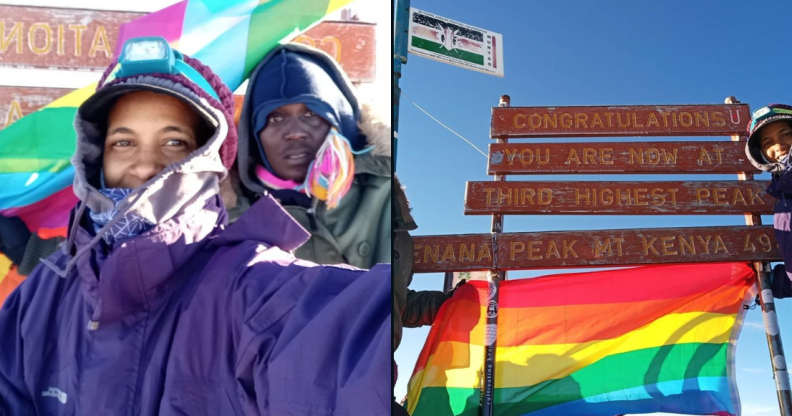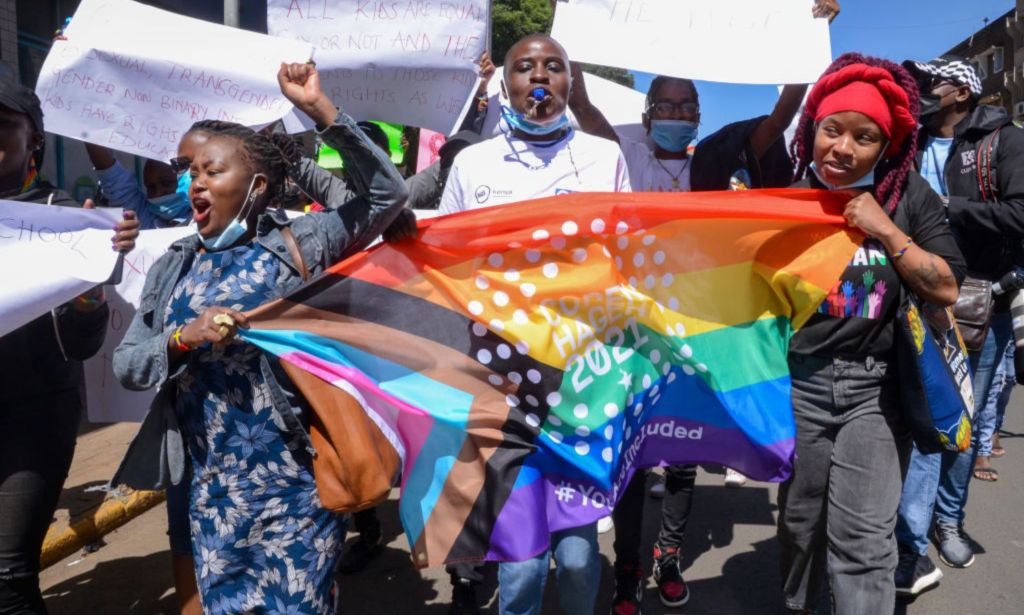Climber’s Pride flag torn down from summit of Mount Kenya. So he’s vowed to do something about it

Twitter user @Juelz_Loverl has vowed to place the Pride flag at summit of Mount Kenya, again, after it was torn down by elders. (@Juelz_Loverl/Twitter)
A man has vowed to climb Mount Kenya – the second-highest in mountain in Africa – again, to place the Pride flag at its summit after it was allegedly removed by elders.
On April 12, Twitter user @Juelz_Loverl posted a photo of himself at the summit of Mount Kenya, with a companion, which the pair had seemingly climbed in 2019 to hang the Pride flag.
He captioned the image: “In 2019 we (Alex and I) put the flag up on Mt. Kenya.
“All this nonsense of it being taken down, I’ve decided 2023 I am going back up Mt. Kenya to put up the flag!”
The post, which has been viewed more than 240,000 times has accumulated hundreds of comments, supporting the climber and LGBTQ+ activists attempt to raise the Pride flag high above Africa.
According to Kenyan news website, Tuko, the flag was removed by elders who scaled the mountain and removed it before burning it in early April 2023.
Kikuyu elders were then said to have followed the burning of the flag with cleansing rituals, including throwing ashes from the burnt flag into the river that flows to the Indian Ocean.
But, alongside the few positive comments many users took to slamming the hopeful activist for his want of equality in Kenya.
Multiple users said putting a pro-LGBTQ+ flag at the summit was a act “arrogance and disrespect” towards the elders that see the mountain as a “sacred place”.
Another user said if the flag is put back up it will swiftly be removed again.
‘We were determined to bring the flag down’
Citizen Digital reported that Kimani Charagu, the founding member of Booi wa Kirira, said taking the flag on top of Mt Kenya desecrated Kikuyu’s holiest shrine.
“It is an affront to Gikuyu spirituality for members of this community to desecrate our Supreme Altar by raising their flag on Kīrīnyaga (Mt Kenya).
“We were determined to bring the flag down and thereafter perform cleansing rites by our sages.”

In Kenya gay sex is a criminal offence, with those convicted facing between five and 14 years in prison.
While sex between women is not explicitly criminalised, lesbians, bisexuals and trans people can face discrimination, including “corrective rape”.
Kenya does not recognise any kind of same-sex relationships and there are no protections for LGBTQ+ people on the basis of sexual orientation or gender identity.
Despite the overt challenges for LGBTQ+ people in the country, a recent win for gay rights saw Kenya’s Supreme Court has ruled in favour of an LGBTQ+ rights group that has been fighting for official status for a decade.
Mount Kenya is the highest mountain in Kenya and the second-highest in Africa, after Kilimanjaro, according to United Nations Educational, Scientific and Cultural Organization.

